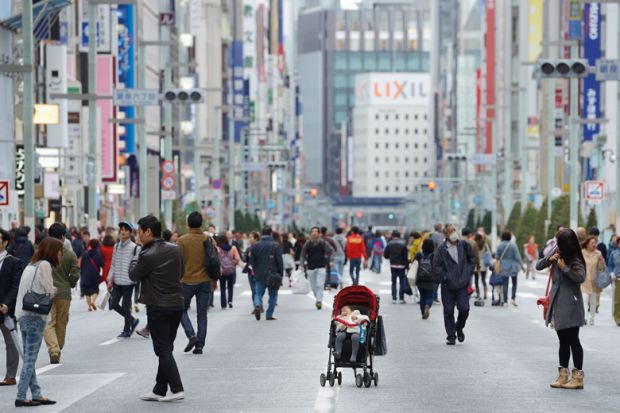Women with student loans in Japan are more likely to remain unmarried and to delay having children than their peers without them, according to a study.
Researchers from Japanese universities have found that student loan debt is a “major financial burden” for young people, particularly women, and is likely to negatively affect family formation in a country that is experiencing declining marriage and birth rates.
Researchers analysed survey responses from 568 Japanese participants aged between 20 and 49, of whom 28 per cent had student loans, for a paper published in Studies in Higher Education. The average student loan debt was about £15,000.
The negative association between student loans and marriage exists only for women, the researchers found, with 35-year-old women with loans 13 per cent more likely to remain unmarried than their peers without the debt burden.
Student loans negatively impact childbearing for both genders, but more so for women than men. Women who marry and have children are often expected to cut their hours in employment to take on caregiving responsibilities. There is also a significant gender wage gap in Japan, with women in full-time employment earning 22 per cent less on average among full-time earners in 2023.
Campus resource: How to manage parental leave for university staff
“Such prospects may reduce women’s desire to get married in a country such as Japan, where it is extremely difficult to pursue a lifestyle that balances a desirable personal life and continue a full-time regular job to repay student loan debt,” the study’s authors write.
They describe their findings as “an unexpected social consequence of the student loan expansion policy that began decades ago”, noting that some 40 per cent of college students in Japan now take out education loans. However, economic downturn, stagnant wages and rising unemployment rates have left increasing numbers of young people unable to repay their loans.
The government introduced a new repayment scheme in 2017, based partially on earnings, to ease pressure on graduates facing a difficult job market, but not all students are eligible.
Last year, Japan’s prime minister proposed reducing the student debt of those who choose to have children in an attempt to reverse the country’s declining birth rate, a plan that sparked anger among some.
“Public opinions are divided regarding the policy that links student loan forgiveness and having children,” said Hideo Akabayashi, an economist at Keio University and one of the academics behind the study. He called for more research into the impact of such a decision.
“Japanese society should not overlook the impact of the student debt burden on the family formation of youth,” the researchers write.
Register to continue
Why register?
- Registration is free and only takes a moment
- Once registered, you can read 3 articles a month
- Sign up for our newsletter
Subscribe
Or subscribe for unlimited access to:
- Unlimited access to news, views, insights & reviews
- Digital editions
- Digital access to THE’s university and college rankings analysis
Already registered or a current subscriber? Login








